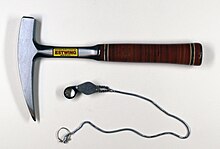Amateur geology
The examples and perspective in this article deal primarily with the United States and do not represent a worldwide view of the subject. (September 2010) |
This article needs additional citations for verification. (September 2010) |

Amateur geology (known as rockhounding in the United States) is the recreational study and hobby of collecting rocks and mineral specimens from their natural environment.
Collecting
[edit]The first amateur geologists were prospectors looking for valuable minerals and gemstones for commercial purposes. Eventually, however, more and more people have been drawn to amateur geology for recreational purposes, mainly for the beauty that rocks and minerals provide.
One reason for the rise in popularity of amateur geology is that a collection can begin by simply picking up a rock. There are also many clubs and groups that search for specimens and compare them in groups as a hobby. Information on where to find such groups can be found at libraries, bookstores, and "gem and mineral shows". Tourist information centers and small-town chambers of commerce can also supply valuable local information. The Internet can also be a useful search tool as it can help find other amateur geologists.
The amateur geologists's principal piece of equipment is the geologist's hammer. This is a small tool with a pick-like point on one end, and a flat hammer on the other. The hammer end is for breaking rocks, and the pick end is mainly used for prying and digging into crevices. The pick end of most rock hammers can dull quickly if struck onto bare rock.
Related fields
[edit]Avid rock collectors often use their specimens to learn about petrology, mineralogy and geology as well as skills in the identification and classifying of specimen rocks, and preparing them for display. The hobby can lead naturally into lapidary projects, and also the cutting, polishing, and mounting of gemstones and minerals. The equipment needed to do this includes rock saws and polishers. Many beautiful crystal varieties are typically found in very small samples which requires a good microscope for working with and photographing the specimen. The hobby can be as simple as finding pretty rocks for a windowsill or develop into a detailed and comprehensive museum quality display.
Safety
[edit]This section contains instructions, advice, or how-to content. The purpose of Wikipedia is to present facts, not to train. Please help improve this article either by rewriting the how-to content or by moving it to Wikiversity or Wikibooks. (September 2010) |
There are many different laws in place regarding the collection of rocks and minerals from public areas, so it is advisable to read up on local laws before prospecting. Rock and mineral collecting is prohibited in most if not all national parks in the United States.[1]
Many sites popular with amateur geologists require driving and/or hiking to remote areas. Navigating the terrain in these places can be quite difficult as the area may have large samples of rocks that make transport difficult. Many amateur geologists prefer to travel in groups in order to reduce the danger of somebody becoming injured and/or stuck. The climate in the areas preferred by amateur geologists can become hot, so precautions such as extra water and sun protection should be taken.
It is advised to use safety goggles whenever rocks are struck, whether breaking open small stones or chipping a piece off a large boulder because small chips of stone could potentially cause damage to the eyes or face. Also, dust is produced by chipping and cutting rock which can be extremely hazardous to the lungs. If necessary, use a mask or respirator.
See also
[edit]- [[Archivo:
- REDIRECCIÓN Plantilla:Iconos|20px|Ver el portal sobre Gemology and Jewelry]] Portal:Gemology and Jewelry. Contenido relacionado con Gemology and Jewelry.
- Fossil collecting
- Geode
- Lapidary
- List of fossil sites
- Mineralogy
- National Fossil Day
- Petrology
- Rock polishing
References
[edit]- ^ Barker, Rachel M. (1997-06-24). "COLLECTING ROCKS". U.S. Geological Survey. Retrieved 2009-04-13.
External links
[edit]- Pages using the JsonConfig extension
- Articles with limited geographic scope from September 2010
- Articles with invalid date parameter in template
- Pages in non-existent country centric categories
- Articles needing additional references from September 2010
- All articles needing additional references
- Articles needing cleanup from September 2010
- All pages needing cleanup
- Articles containing how-to sections
- Hobbies
- Geology
- Mineralogy
